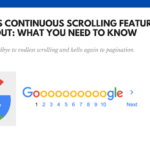Guest Post
SEO, the act of optimizing a website for search engines, can be a rewarding undertaking. It can give your site better web presence. It can improve your online visibility. It can give you an edge over competition. It helps draw traffic to your site.
However, SEO is a time-consuming and endless process consisting of multiple tasks. You need to do link building, keyword research and analysis, directory submissions, blogging, and many, many more. Then each task has sub-tasks, and doing them on a day-to-day basis can leave you exhausted and frustrated. How do you stay on top of all these?
Fortunately, SEO developers have created tools that enable webmasters to accomplish specific tasks more efficiently and quickly. These tools enable you to optimize your work and time even as you improve the traffic flow to your site. There are dozens of tools out there, but remember even if you have the best tools on your best laptop, Google is ever changing, so you need to stay updated all the time.
Here are the top 5 most useful tools:
The Google Webmaster Tools is a set of resources that gives you a solid understanding of how Google sees your site. It’s actually a keyword analysis and a diagnostic tool in one. It shows you what keywords Google sees when it visits your sites and the number of click-throughs each keyword receives. Do you see your target keywords in the list? Are you receiving the number of click-throughs you have hoped to achieve? If not, the Google Webmaster Tools also provides some tips on how you can improve the performance of your site.
The Webmaster Tools can also audit your site. You can use it to check for duplicate titles, duplicate descriptions, broken links, website speed, moved content, and malware, giving you the opportunity to correct the issues and improve your site’s performance
Backlinks are one of the criteria for how search engines rank your site. More important than quantity of backlinks for search engine is the quality. Quality is measured using three criteria: where the banklinks originate from (popular vs low-ranked or empty websites), validity of the link, and the relation of the anchor text to the destination page (e.g. if the anchor text says 'best laptop', it should point to a site about laptops and not cars or something else). Backlink Checker is a tool that helps you determine how the links leading to your site are helping (or not helping) your page ranking. It scours the web, then gives you a detailed report about the quality and the number of backlinks pointing to your site.
The keywords that you use can mean the whole difference in the outcome of your SEO campaign. The SEO Book is a keyword research tool that helps you find the most relevant keywords to your niche or post topic. It’s one of the most comprehensive free keyword research tools out there, providing you a variety of keyword variations and long tail keywords that you can use in your post. In addition to the keyword research tool, creating a free account with SEO Book also gives you unlimited access to other SEO tools, such as keyword density analyzer, PPC keyword wrapper, and AdWords ad group generator.
The Microsoft SEO Toolkit is one of the most powerful auditing software out there. It lets you check your website for SEO violations, such as broken links and missing alt tags, giving you an opportunity to correct them. Even better, it provides potential solutions to these issues and how you can improve it for better search results.
Because search engine rankings directly impact your bottom line, you need to make sure you stay on the top of the search results. The SEO Rank Tracker by SEO Moz makes it easy to keep track of your page and keyword rankings in multiple search engines. If you want to know, for instance, where your site ranks for 'best laptop', just type it into the search box. No more manual hunting for a URL buried on page 20 of search engine results pages.
There are many more amazing SEO tools out there that scale down your efforts and increase your productivity. Sound off below your favorite ones!
This post is a guest post by "Sujatha who is an engineer by profession and loves to write about technology, gadgets and the world wide web."
February 12, 2013




